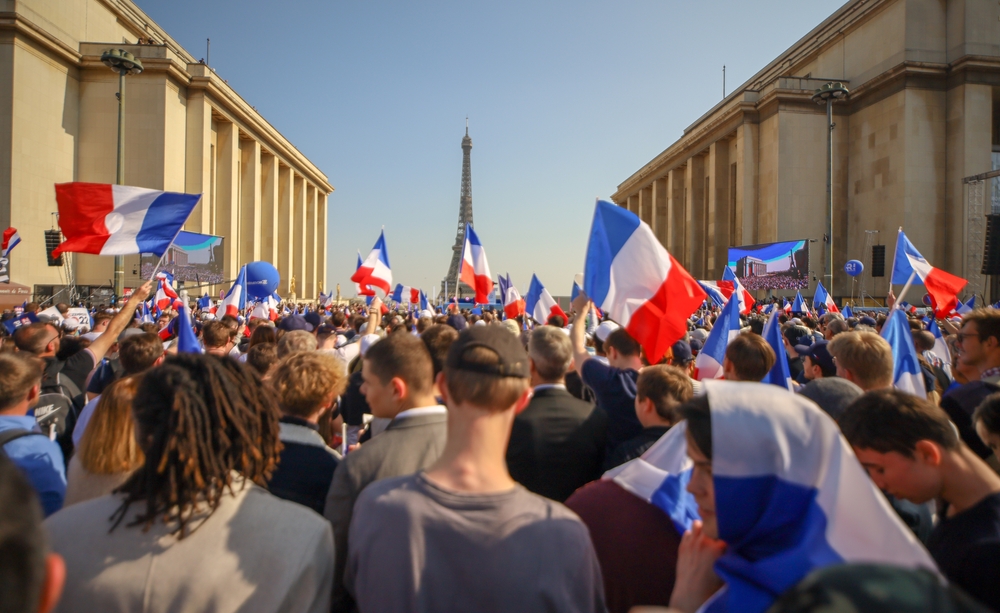Nearly 20 people were killed in Paris during and immediately following the Islamist attack on satirical magazine Charlie Hebdo in January 2015. Then, in November of that same year, terrorists killed 130 and injured hundreds more in a series of coordinated attacks across Paris that included suicide bombers detonating explosives outside the Stade de France, indiscriminate shootings at crowded restaurants, and the storming of the Bataclan concert hall, where an American rock band played for a sold-out crowd of 1,500. A few months after that, in July 2016, two Muslim men slashed the throat of 85-year-old Roman Catholic priest Fr. Jacques Hamel as he finished saying Mass in his Normandy parish.
With the exception of a tiny group of Islamists, France’s relatively small Muslim community was just as outraged and traumatized as non-Muslims by the enormity of these and other religiously motivated terror attacks in France. These included the murder and beheading of Samuel Paty, a teacher who, as part of a lesson, had shown his students the Charlie Hebdo cartoons that had sparked the 2015 attacks on the magazine’s offices. In response, the French president and national legislature enacted measures in 2021 to support “respect for the principles of the Republic,” which did not use the term “Islam” or “Islamism” but clearly targeted Muslim communities.
All this has unfolded inside a nation whose present identity and system of government rests on explicit identification as secular, with no place in public for religion. In fact, French Minister Gabriel Attal made the decision just last month to ban a traditional form of Muslim dress for women. He argued that “the school of the Republic was built around strong values, [and] secularism is one of them. … When you enter a classroom, you shouldn’t be able to identify the religion of pupils.” Are security measures enough, however, to counter the threat of Islamist terrorism? Does legally enforced uniformity of dress for teenage girls truly advance any principle of the Republic?
The Constitution of the Fifth Republic, which went into effect on this day 65 years ago, is the second French constitution to codify official state secularity, a principle known as laïcité. But the document also preserves the tradition, dating back to 1848, of the constitutional codification of the Revolutionary tripartite motto turned civilizational ideal: liberté, égalité, fraternité—liberty, equality, and fraternity. And it incorporates by reference the Declaration of the Rights of Man and of the Citizen, which includes mentions of natural law and natural rights. These principles make implicit moral claims that require moral language to be intelligible. But the imposed secularity of laïcité forecloses the possibility of moral vocabulary that is built on anything more than pragmatism and preference. French citizens must leave their religious commitments at home as they enter the public square. They cannot do so as French Christians, French Muslims, or French Jews—only as French citizens, but ones who lack any meaningful reference to the moral heritage of the nation.
When the Constitution of 1848 first identified liberté, égalité, fraternité to be a singular “principle” of the Republic, the Roman Catholic Church represented the established state religion of France. This remained the case until 1905, when the national legislature passed a controversial and draconian law not only disestablishing it but making church and synagogue buildings government property among other things. This law forged the groundwork for the incorporation of laïcité into the two subsequent French constitutions.
Constitutions are complex documents. They are at once actively enforceable legal instruments and artifacts of the eras in which they were composed, which can present interpretative challenges. There is no doubt that the present constitution has provided a framework for a nation that ranks high on Freedom House’s Freedom in the World index, but this internal incoherence has hampered rather than helped to realize this lofty ideal. Not all the French were devout Roman Catholics in 1848, but a nation that at once establishes a church and articulates ideals in the form of morally significant language cannot later claim that these are two unrelated facts.
The notion of a secular state is one that has uniquely evolved in the Christian West and should not be abandoned. While an established church may function quite well in some settings, this does not mean that France should return to such a system. Laws that bind citizens should be accessible by ordinary reason rather than the tradition-specific knowledge accessible only through a religious text such as the Bible or the Qur’an. But the radical secularism of modern France extends beyond this and requires a practical denial of the Judeo-Christian heritage of the nation that is present in every aspect of the culture, including the value-laden constitutional articulation of the goals of the Republic.
The radical secularism of laïcité has only been workable in France because of the religious homogeneity of the nation even at the point of disestablishment in 1905. French culture, institutions, and public discourse had already been shaped by hundreds of years of Christianity, so the imprint of the religion was and is inescapable even as most French citizens stopped practicing or even identifying with the faith. So the imposed secularization of non-Christians, most of whom emigrated from French colonial territories, has not been a religiously neutral project. Instead, political principles and cultural practices that are commonplace and not especially religious according to the sensibilities of a secular French native may be quite foreign and even in conflict with the worldview of an Algerian or a Lebanese Muslim immigrant.
Beyond even the advantage that the native French have in such a system, toleration of religious differences allows each citizen to participate fully in public life. Theoretically, all citizens in such a secularized system must relegate their most deeply held beliefs to a category of merely private matters. Religious beliefs are metaphysical beliefs and so, arguably, inform every other belief a person holds. They are at the core of individual identity, self-perception, and a personal relationship with the wider world. To be fully human requires that we be allowed to enter the public square in a way that comports with personal conscience rather than be required by law or custom to conform to an artificial and unattainable morally neutral public persona.
Of course, not all religiously motivated behavior can be tolerated. Islamists should not be permitted to intimidate the media or teachers into self-censorship on pain of death. But the line that does exist necessarily lies somewhere between traditional Muslim dress in school and storming a crowded theater with assault weapons. That line, however, is not easily found unless people of good will can engage honestly and openly about the values that shape their worldview and how best they understand the vocation of citizenship that is oriented toward and shaped by moral principles such as liberty, equality, and fraternity.
The French do have much to celebrate today on this anniversary of their constitution. Since the 1789 Revolution, France has had about 18 governments, and the Constitution of the Fifth Republic has provided the basis for the second-longest-lasting one. France has been rebuilt from the ruins of World War II into a free and open society that is one of the most prosperous nations in the world. But as its demographics shift, the tensions within the constitution will only grow increasingly taut as unrealistic expectations are placed on citizens to embrace radical secularity in the public square and abandon religion and even religious difference as a tool for understanding and engaging with one another. The system has not ruptured, and it may adapt so that it will not ultimately. But the introduction of the concept of laïcité into a system already built with moral assumptions in place may very well be an overlooked factor in the fraught relationship between France and its citizens who are religious minorities.

